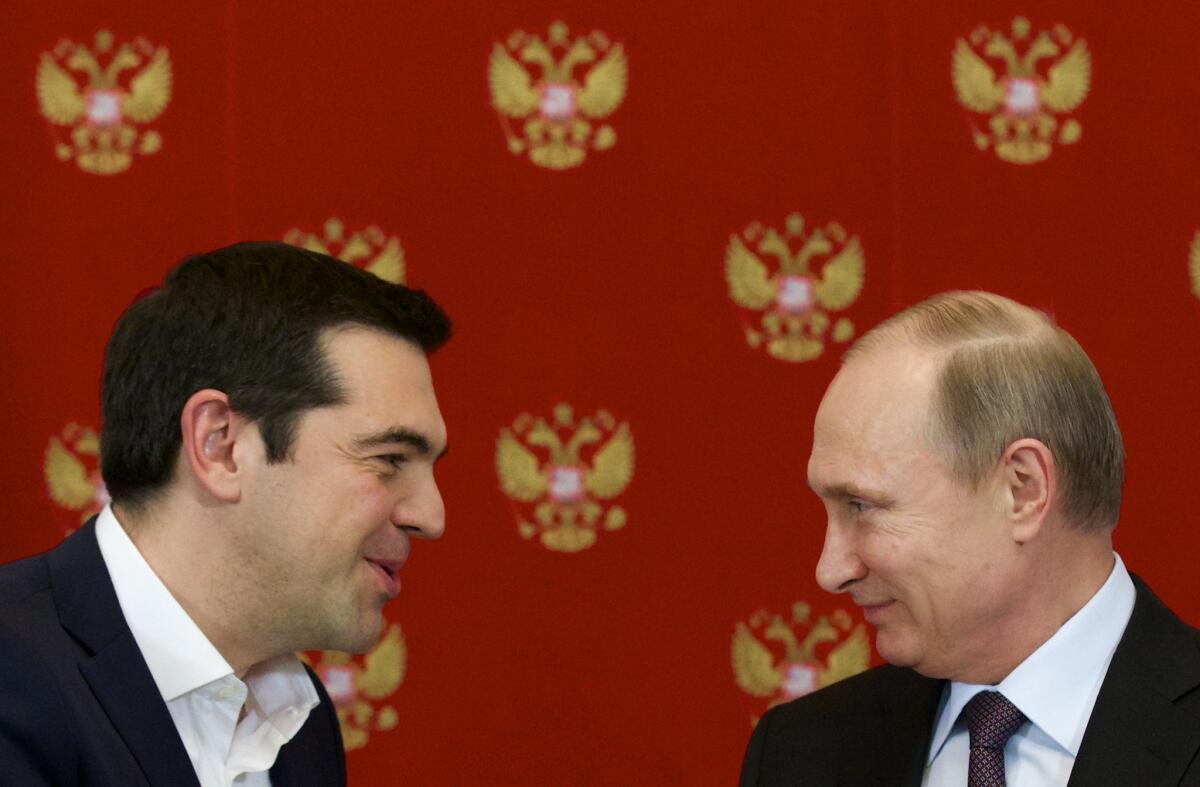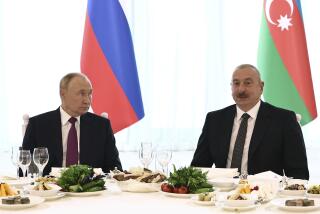Russian, Greek leaders talk of restoring trade despite sanctions

Greek Prime Minister Alexis Tsipras, left, and Russian President Vladimir Putin on Wednesday discussed ways of reviving trade in spite of European Union sanctions and Russia’s retaliatory embargo on European food imports.
- Share via
A visit to Moscow by Greek Prime Minister Alexis Tsipras on Wednesday raised concern that he might ask the Kremlin for financial aid to gain a bargaining chip with Western creditors reluctant to ease the harsh austerity measures imposed on the Balkan country.
Russian President Vladimir Putin told journalists after meeting with Tsipras that his Greek guest made no request for a handout. But the Kremlin leader said he had invited Greece to participate in building and operating the Turkish Stream pipeline that could generate hundreds of millions a year for the Athens government.
The pipeline project is still in the talking stage, Putin said, as was his offer to exempt Greece from a trade embargo on food imports from the European Union. Moscow barred the importation of select agricultural products from EU countries last year in retaliation for the Western bloc’s economic sanctions to punish Russian aggression in Ukraine.
No deals have been announced yet from the Greek government chief’s visit, which will continue through Thursday. But the discussion of lucrative collaboration between the traditionally friendly states has also heightened concern in the West that Greece will scuttle the sanctions on Russia in exchange for a share of the pipeline business and resumed food sales. The sanctions expire in June, and all 28 European Union member states must endorse any extension.
At a news conference with Tsipras, Putin said the two had discussed “what we could both do” to restore the mutually advantageous trade that existed before the sanctions. Russia was Athens’ biggest trade partner in 2013.
Trade between Greece and Russia fell 40% last year, primarily because of reduced gas imports by cash-short Athens but also from a 12% drop in Greek food exports. Greece imports 57% of its gas from Russia.
If Greece decides to participate in the Turkish Stream project, it will “raise Greece’s geopolitical status” and help create jobs, Putin said.
“The new route will provide for the Europeans’ needs in fuel and would allow Greece to become one of the main power distribution centers on the continent, could help attract significant investments into the Greek economy,” the Sputnik news agency quoted Putin as saying.
Greece “will be receiving good money for transit, amounting to hundreds of millions of euros annually,” Putin said. A euro was worth $1.08 on Wednesday.
The unemployment rate stands at more than 26% in Greece, where the economy has contracted by 25% during a painful five years of austerity measures undertaken in exchange for $260 billion in bailouts.
“Greece demands and gets a lot of solidarity from the EU,” European Parliament President Martin Schulz said in a newspaper article published Wednesday, telegraphing a warning to Tsipras ahead of his Moscow trip to remain true to the European alliance.
Since coming to power less than three months ago, Tsipras and his Syriza ministers have ruffled feathers among European partners with hints that they might torpedo the bloc’s sanctions on Russia.
Tsipras and his leftist Syriza party were elected in January on promises to force lenders to ease their demands for massive state job cuts and privatizations.
Greece is locked in tense negotiations on restructuring its debt with European and international lenders to get desperately needed bridge loans to keep the economy afloat. It faces a Thursday deadline for repayment of $486 million to the International Monetary Fund.
Greek officials said as Tsipras set out for Moscow that he would not seek Russian financial aid, and Putin said he had not. But the Kremlin leader observed that the Greek visit’s timing was fortunate, coming just before the Easter observance of their shared Orthodox Christian faith.
Russian Foreign Minister Sergei Lavrov had said recently that Moscow was open to considering any loan request from Greece.
Special correspondent Carassava reported from Athens and Times staff writer Williams from Los Angeles.
Follow @cjwilliamslat for the latest international news 24/7
More to Read
Sign up for Essential California
The most important California stories and recommendations in your inbox every morning.
You may occasionally receive promotional content from the Los Angeles Times.











